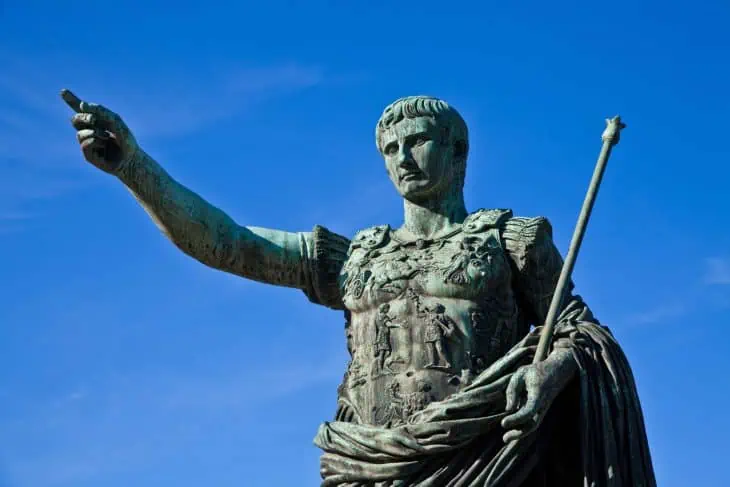
The great Julius Caesar never ruled as a Roman Emperor. However, even if he never got to that level, he set an excellent example for the people under him to emulate. He conquered lands for Rome, dominated its politics at home, and even gave his name as their title. Even after Rome fell, Caesar’s legacy continues to influence generations of rulers across history. Many history books are full of amazing Julius Caesar facts.
Gaius Julius Caesar is one of history’s most interesting figures. He was one of the most promising military leaders of the ancient world, and one of the most powerful politicians of his time. This is a man who, by the power of his will and ability, overthrew the Roman Republic and established the Roman Empire.
Many of the men under Julius Caesar admired his leadership style. In fact, he reportedly knew most of his men by name, a quality that won him the troops’ loyalty and admiration. Caesar advocated for the interests of the common people. He was a great orator and spoke with a high-pitched voice and a commanding tone. Further, he ruthlessly investigated and criticizing former governors involved in corruption.
Caesar’s work was so iconic, a comet appearing after his assassination made the Romans believe he was a deity. Even in death, Caesar made a point to make his presence felt. Read more about Julius Caesar’s influence on the world and his outstanding leadership style below. Learn more about this amazing man with these 80 Julius Caesar facts.
- Julius Caesar had three wives over his lifetime: Cornelia, Pompeia, and Calpurnia.
- Caesar and Cornelia only had one child by the time of her death, Julia, who became his only legal biological child.
- Caesar’s only other legal child was his grandnephew Octavian, who he adopted as his son and heir.
- Shortly before he died, Caesar had one natural son with his mistress Cleopatra, Caesarion.
- Caesar had two other known mistresses: Servilia, and Queen Eunoe of Mauretania.
- Historians place Julius Caesar’s birth date on July 12, 100 BC.
- He first gained an elected post, that of military tribune, in 73 BC.
- He later became elected as a quaestor in 69 BC, and then as aedile in 65 BC. A quaestor is a public official in Rome, while an aedile is an elected office of the Roman Republic.
- Caesar became elected as praetor in 62 BC. A praetor is a judicial officer responsible for the production of public games.
- He then became governor of the Roman province of Farther Spain, modern Portugal, and Andalusia, in 61 BC.
- He later became elected as a Roman consul in 59 BC.
- Caesar then conquered Gaul from 58 BC to 50 BC.
- After the Roman civil war from 50 to 48 BC, the Senate appointed Caesar dictator.
- In 44 BC, the Senate appointed him dictator for life.
- On March 14, 44 BC, senators led by Brutus assassinated Caesar outside the Senate.
- Julius Caesar’s family belonged to the aristocratic Roman patrician class. The term patrician refers to members of the upper class, while the term plebeian refers to the lower class.
- They also claimed descent from the goddess Venus.
- Caesar’s father shared the same name as his son, Gaius Julius Caesar.
- Caesar’s adopted son and heir, Octavian, later became Augustus, the first Roman emperor.
- Augustus’ ascension turned their family into the Julio-Claudian Dynasty.
Caesar’s name has a story of its own.
His name Julius came from his membership in the gens Julia, one of the most ancient patrician families in ancient Rome. The name Caesar, however, has four different possible origins according to Roman historians.
First, one of Caesar’s ancestors may have needed Caesarean surgery to survive childbirth. Second, the first Caesar may have had a thick head of hair, with his name coming from the Latin adjective, “caesaries.” Third, he may instead have had grey irises, and his name came from the Latin adjective “oculis caesiis.” Finally, the first Caesar may have gained his name from killing war elephants during the Punic Wars.
The name might have come from the Moorish word for elephant, “caesai” Most historians think he may have preferred the last theory for the origin of his name. This is due to the fact that Caesar issued coins featuring images of elephants, an action that suggests he favored the latter interpretation of his name.
It also remained in use over the 2,000 years after his death.
The name Caesar became synonymous with the title Emperor, at first of Rome, and then for any Western Emperor in general. It even gained a place in the Bible, with Jesus’ own teaching of “render unto Caesar what belongs to Caesar”.
Later on, the name Caesar became transliterated into other languages’ versions of the title Emperor. For example, the German Kaiser, and the Russian Tsar, all have their roots in Caesar’s name.
The title of Tsar, in particular, remained in use until 1945, with the abdication of Tsar Simeon II of Bulgaria. Only then did the title and name of Caesar pass out of use, over 2000 years since the man’s own death.
Caesar supposedly suffered from epilepsy.
Here’s an interesting example of Julius Caesar facts. The Greek historian Plutarch first made the claim in the 2nd century AD, but Roman records do testify that Caesar had at least four epileptic attacks in his lifetime.
Other historians of the time disagree, attributing Caesar’s attacks to a tapeworm infection of the brain. Modern historians also remain divided over the cause of Caesar’s attacks, with most believing it was caused by hypoglycemia, or low blood sugar.
In the 21st century, however, some modern historians have pushed forward another theory. They argue that instead of a symptom of another condition, Caesar really had a nervous disorder causing his attacks, specifically Temporal lobe epilepsy.
William Shakespeare claimed Caesar also suffered from deafness in one ear.
Shakespeare described it in his biographical play of Caesar’s life, named after Caesar himself, Julius Caesar. Shakespeare, however, only popularized the notion, with historians even claiming he misinterpreted Plutarch’s description of one of Caesar’s habits.
Specifically, Caesar may have covered his left ear, while asking others to speak to his right ear. However, he did this as an act of theater, miming a similar action by Alexander the Great. And even then, it did not point to deafness of any kind, but a symbolic gesture of Alexander refusing to hear any more accusations, and would instead listen to the defense before passing judgment.
Other scholars suspect Caesar may have suffered from cardiovascular disorders.
They base this on recorded symptoms Caesar suffered in his advancing age. Those include headaches, sensory deprivation, vertigo, and even his growing recklessness and other behavioral issues.
They argue that, together with Caesar’s attacks, they point not to epilepsy, but to cerebrovascular episodes where Caesar’s brain lacked enough oxygen to function properly. They also point to how Caesar’s own father and grandfather may have died from either a stroke or a heart attack. All this then comes together to point to Caesar suffering from one kind or another of cardiovascular disease.
Caesar’s family lacked political power despite their high social status.
Caesar’s father did manage to become governor of the Roman Province of Asia, which covers most of the western region of modern Turkey. Caesar’s Aunt Julia also managed to marry the famous Roman Consul, Gaius Marius. Their family’s high social status also meant Caesar became a High Priest of Jupiter before the age of 20, after his father’s sudden death.
Caesar’s family became caught in a political rivalry during his youth.
Their association with Gaius Marius dragged them into his power struggle against his rival and co-consul, Lucius Cornelius Sulla. Marius’ death led to Sulla’s victory by default, resulting in Caesar losing his priesthood and inheritance.
Sulla even wanted to have Caesar executed as a political criminal, only to meet opposition from his own supporters. These included Caesar’s relatives on his mother’s side of the family, who intervened out of shared blood ties. Rome’s own Vestal Virgins also intervened in Caesar’s favor, forcing Sulla to spare the young man’s life.
Caesar’s first experience in the army proved his talent in military affairs.
Ironically, he originally joined the Roman Army to get away from Roman politics, and in particular, possible confrontations with Sulla. In this time, he served under two generals, Marcus Minucius Thermus, and Servilius Isauricus.
He received commendations for his actions in the Siege of Mytilene, and later found himself sent to Bithynia. There, he gained favor at the court of King Nicomedes, and managed to gain the support of Bithynia’s fleet for Rome’s war efforts in the east.
Caesar also later found himself held hostage by pirates.
Now there’s a surprising example of Julius Caesar Facts. This took place in 76 BC, well after Sulla’s death, at which point Caesar returned to Rome. In that year, pirates attacked Caesar and other Romans while sailing across the Aegean Sea. They then demanded 20 talents of silver to pay for his release, or equivalent to 640 kilograms of silver.
Caesar, however, insisted that they demand 50 talents, or 1,600 kilograms of silver, while also swearing vengeance on the pirates. The pirates took Caesar’s oath as a joke but raised their demands on his insistence. Rome paid the ransom, and later that same year, led a fleet to hunt the pirates down. He then had them crucified as Roman law set the punishment for pirates.
Caesar compared himself to Alexander The Great.
This happened around 69 BC while Caesar served out his duty of quaestor in Hispania. There, Caesar found himself seeing a sculpture of Alexander the Great, and compared the two of them against each other. Caesar noted that at his age, Alexander had already conquered an empire for himself, while Caesar had done little to earn himself fame and glory.
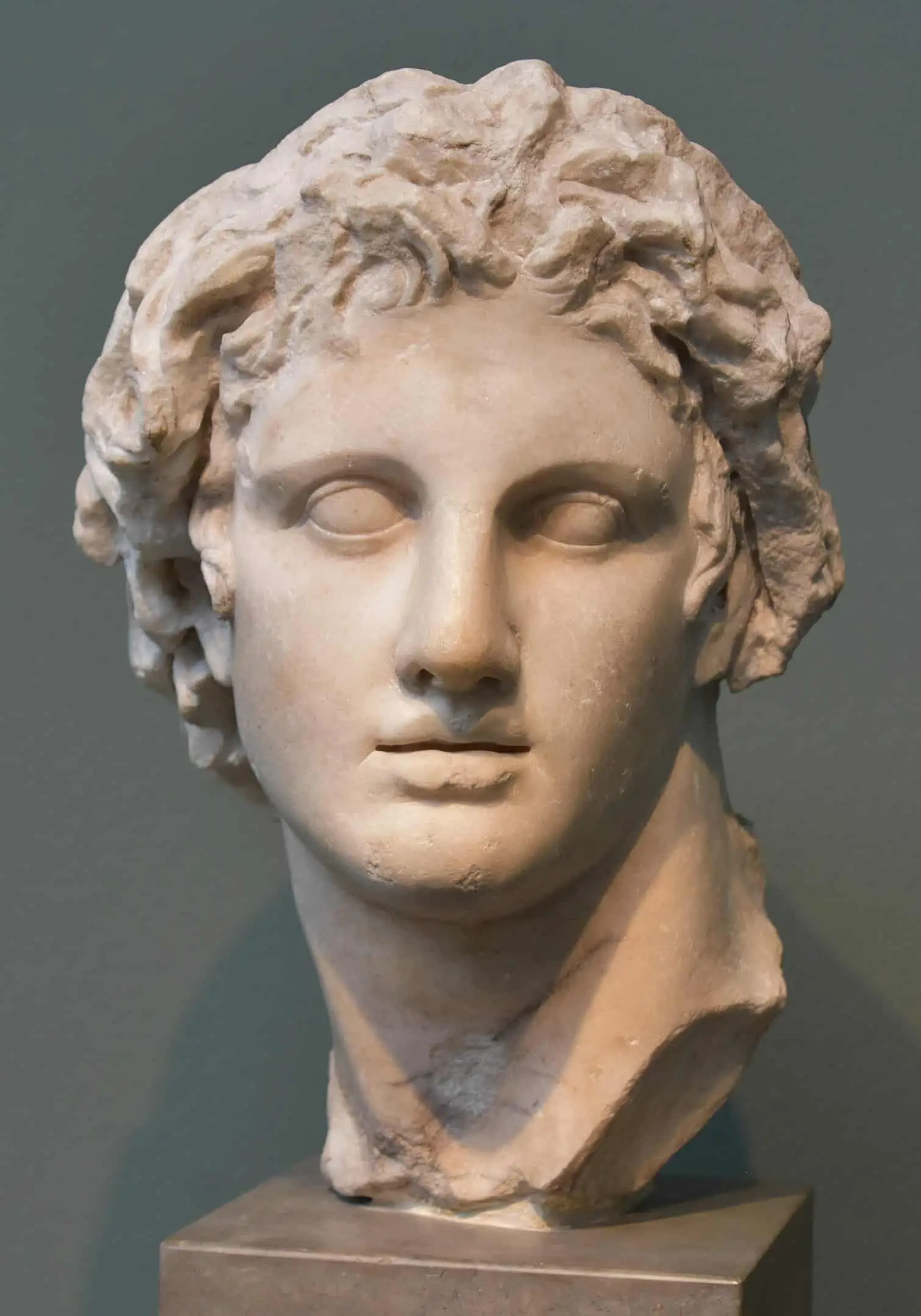
Caesar first received the title of Imperator in 60 BC.
The title would later evolve into Emperor, but it had a different meaning during the Roman Republic. It literally means “commander,” and troops had to vote it to their commanding officer.
Officers who earned the title could then petition the Senate to grant them a triumph, the right to hold a victory parade in Rome. This became a problem for Caesar, as tradition dictated he stay outside the city until after his triumph.
However, this would mean he wouldn’t be able to campaign for the consulship that year. He petitioned the Senate for an exception, only for the Senate to reject his petition. In the end, Caesar withdrew his earlier petition for a triumph, allowing him to return to Rome in time for the election.
The consular election of 60 BC went down as a corrupt one in history.
Both Caesar and his rivals used underhanded methods to win the offices of the consulate. Even Senator Cato, who was known for his integrity, ended up resorting to bribery to ensure his candidate won the office. In the end, while Caesar did become consul that year, he had to share the office with his rivals’ candidate, Marcus Bibulus.
Caesar’s co-consul Marcus Bibulus found himself isolated from power in their term.
It began with Bibulus’ opposition to Caesar’s proposal to distribute public lands to the poor. Caesar’s ally, Pompey Magnus, responded by bringing soldiers loyal to him into Rome, which worked to intimidate the rest of the opposition.
Bibulus persisted, invoking religion to support his position and claiming that bad omens pointed to divine disapproval of the proposal. This led to a riot where Bibulus’ bodyguards found themselves overwhelmed, his supporters beaten, and a bucket of feces thrown at Bibulus himself. The consul spent the rest of the year hiding in his house, leaving Caesar as the only consul exercising authority that year.
Caesar also formed the First Triumvirate that same year.
Triumvirate literally means three men. In this case, the triumvirate referred to an alliance made to control the government. Caesar made up one member of the First Triumvirate, with Pompey Magnus becoming the second member.
Their third member was Marcus Licinius Crassus, the richest man in Rome. Ironically, all three men saw each other as rivals, but also realized they needed each other to achieve their ambitions. To cement their alliance, Pompey married Caesar’s daughter, Julia.
The Senate tried to limit Caesar’s power after his term of office.
Traditionally, after a consul steps down, they receive an appointment as provincial governor. Fearing Caesar’s ambitions, the Senate at first moved to make Caesar responsible for the forests and pastures in Italy. However, Pompey rallied his political allies, allowing Caesar to become governor for Cisalpine Gaul and Illyricum. This gave Caesar control of territories, which now included modern Italy’s northern region, as well as Southeastern Europe.
Later on, Caesar also received control of Transalpine Gaul, including the southern region of modern France. In addition to all the resources and wealth of those regions, Caesar commanded all four legions that garrisoned those provinces.
Caesar reached the height of his military career with the Gallic Wars.
In just eight years, Caesar made the biggest expansion of the Roman Republic within a set time. By the end of his campaign, all of continental Europe, west of the Rhine River, counted as Roman territory.
This included not just all of modern France, Belgium, and Luxembourg, but also most of modern Switzerland. Parts of modern Germany and the Netherlands also lay included in Roman Gaul. Caesar even made brief landings on Britain during the Gallic Wars.
He also recorded his personal experience in the Gallic Wars in a series of books.
He called them “Commentarii de Bello Gallico,” literally meaning “Commentaries on the Gallic Wars.” A series of eight books, Caesar actually only wrote seventh of them, with the eighth written by Aulus Hirtius following Caesar’s death.
Historians have mixed opinions about the Commentaries, noting deliberate exaggerations in the numbers recorded in the books. This has led some historians to wonder if Caesar deliberately wrote the Commentaries as a form of propaganda to support and expand his reputation. Regardless, the Commentaries remain the only examples of Caesar’s written legacy to survive to the modern day.
The wars first began with a campaign against the Helvetii.
Five Celtic tribes made up the Helvetii. These tribes attempted to migrate from the Swiss Plateau to the Atlantic coast. However, the Roman Province of Transalpine Gaul lay in their way, but after receiving a warning from Caesar, detoured around the province to the north.
Caesar, however, attacked, leading some historians to see it as one of the earliest examples of a war of aggression with imperialist expansion in mind. For its part, the Senate supported Caesar, fearing the Helvetii’s migration would allow German tribes to take their place on the Swiss Plateau. After the Helvetii’s defeat, this led Caesar to force them to return to the Swiss Plateau and keep the Germans away from Italy.
After defeating the Helvetii, Caesar then attacked the Suebi.
Who were the Suebi? They were a Gallic tribe. The Suebi originally came from Eastern Germany and migrated towards the Marne and Rhine Rivers around 61 BC. Along the way, they forced the Sequani, another Gallic tribe, and Harudes a Germanic group, to submit, leading to Roman concerns about a German threat to Gaul. Gaul was a region of Western Europe inhabited by the ancient Gauls.
At first, the Senate tried peaceful ways to keep the Suebi in line, even making them an official ally in 59 BC. However, the Suebi’s attacks on another Roman ally, the Aedui, gave Caesar an excuse to go to war. The Aedui were a Gallic tribe living in the modern Burgundy region during the Iron Age and the Roman period.
Following failed attempts at diplomacy, Caesar defeated the Suebi in 58 BC. He then forced them to retreat back east, over the Rhine River.
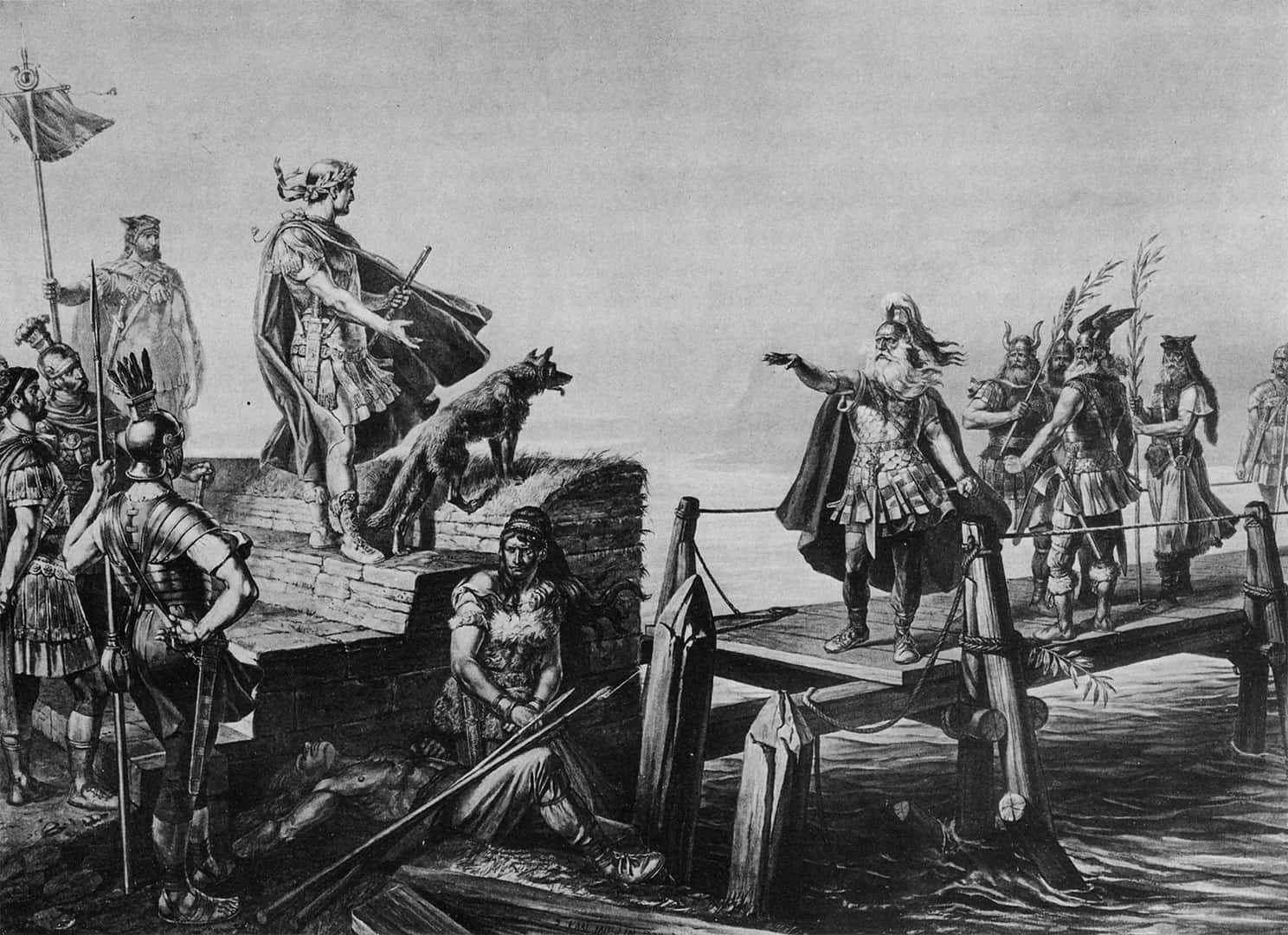
The Belgae became Caesar’s next target.
As the name implies, the Belgae lived on land that today makes up modern Belgium. Like the Suebi, the Belgae had attacked Roman allies, which gave Caesar an excuse to go to war against them. He won an early victory at modern Villeneuve-Saint-Germain, a commune in the Aisne department in Hauts-de-France in northern France. This forced the Bellovaci and Ambiones to surrender.
The Bellovaci were a Belgic tribe staying in the modern Picardy region, near the present-day city of Beauvais, during the Iron Age and the Roman period. The rest of the Belgae, however, refused to surrender, and instead decided to keep fighting.
Other Gallic tribes united against Caesar, seeing him as a common enemy.
The Nervii, in particular, formed an alliance with the Atrebates and Viromandui. All three tribes had become disturbed over Caesar’s campaigns in Gaul and predicted he would eventually try to conquer all of Gaul. They ambushed Caesar at the Sambre River in 57 BC, catching the Romans by surprise, and nearly winning the battle.
However, superior Roman discipline and training allowed them to hold the line, long enough for reinforcements to arrive. Out of 75,000 men at the start, the Belgae lost 60,000, forcing them to surrender to Caesar afterward. Caesar granted them mercy, placing them under Roman protection and warning other tribes from attacking them.
Conquered tribes also rose up against Caesar.
Specifically, the Veneti tribes of Northwestern Gaul, who found themselves forced to feed the Roman Army during the winter of 57 to 56 BC. When the Romans sent more troops to collect supplies in 56 BC, the Venetii took them hostage. They also allied themselves with the Armorica tribes, and built a fleet. When the Romans attacked on land, the Gauls used their fleet to move men and supplies by sea between their forts.
The Romans sent a fleet of their own but found themselves delayed, as they had built their fleet for calmer Mediterranean waters. In the rougher waters of the Atlantic Ocean, the Romans unexpectedly found themselves struggling. Eventually, however, the Roman Navy attacked during calm weather and destroyed the enemy fleet. This forced the Gauls to finally surrender.
Caesar committed war crimes against the Celts during the Gallic Wars.
After defeating the Venetii, a Gallic tribe, and their allies, Caesar had their surviving leaders executed. He then enslaved the rest of the Venetii and the Armorica tribes. The Armorica tribes came from the northwestern extremity of Gaul, now Brittany.
He also engaged in slaughtering civilians he found settled on Roman territory. At one point, he even claimed to have 430,000 people in a single German camp. Modern historians consider the number exaggerated, but do not disagree that Caesar essentially committed mass murder. Such brutality horrified the Senate, with Caesar’s enemies planning to have him arrested and brought to court for his actions after the war’s end.
He also became infamous among the Germans for building bridges across the Rhine River.
The sheer width of the Rhine River led the Germans to believe the Romans could never bring troops across quickly enough to properly attack. They found themselves unpleasantly surprised then when Caesar built bridges over the Rhine in 55 BC.
This allowed him to invade Germany, and after pillaging the east bank, retreat back into Gaul. He also burned the bridges behind him, keeping the Germans from pursuing. This, in turn, gave Caesar a terrifying reputation among the Germans for doing the impossible.
Caesar also launched the first Roman expedition to Britain.
The British tribes had supported the Gauls against Caesar, which gave him an excuse to attack Britain. He first attempted to land at what would become modern Kent, only to find the British waiting for him.
This led him to sail north, to Pegwell Bay, only to again find the British waiting for him and bad weather brewing. Caesar refused to retreat, however, and instead ordered his troops to land, and despite a slow start, managed to form up a battle line. The British retreated, with the Romans not pursuing for lack of cavalry.
Roman troops hesitated at first to land on Britain.
A combination of bad weather and the sight of the British having large numbers of chariots intimidated the Romans. They only followed Caesar after the Tenth Legion’s standard-bearer finally jumped from his ship and waded to shore.
This put the Tenth Legion’s standard and the golden eagle at risk of capture, which would have humiliated the entire legion. The legion thus landed, moving to support their standard-bearer, with the Seventh Legion also landing to join them on the shore.
Historians consider Caesar’s expeditions into Germany and Britain as publicity stunts.
This comes from how Caesar failed to take any territory, instead only attacking to show Rome’s enemies, Rome’s military power. This also allowed Caesar to play himself up in the public eye, showing off easy victories with little loss of life for the Romans.
Caesar’s attack on Britain in 55 BC especially captured the Roman public’s imagination. If nothing else, it proved that Rome could land troops on Britain, and raised hopes for a proper conquest in the future.
In 54 BC, Caesar launched a full invasion of Britain.
He brought five legions with him this time, including over 2,000 horsemen, and a bigger fleet than during the previous year. The British resorted to guerilla tactics, but after a failed ambush, most of the British tribes surrendered to Caesar.
Only King Cassivellaunus of the Catuvellauni kept on fighting until Caesar defeated him at modern Wheathampstead. Caesar then negotiated a treaty where the Romans would leave, and the British would pay an annual tribute to Rome.
As Britain proved rather poor by Roman standards, this tribute came in the form of slaves and grain. This led to criticism from the Senate, with Cicero complaining how Caesar had wasted Rome’s money with his invasion of Britain.
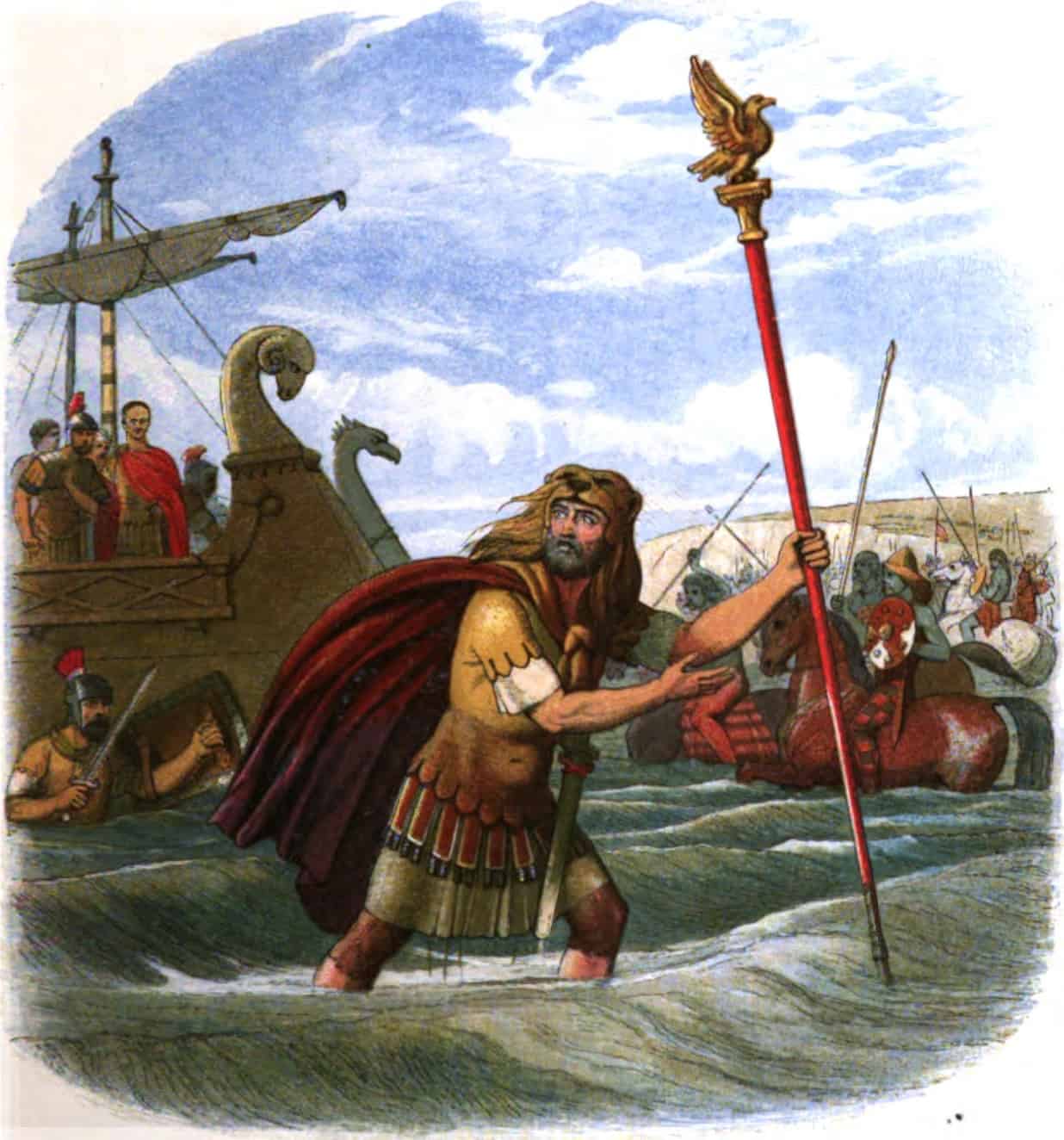
More revolts erupted in Gaul that same year.
Again, they erupted over how the Romans forced the Gallic tribes to feed the Roman Army over the winter. The Eburones, a Gallic-Germanic tribe, dwelling in the northeast of Gaul, revolted first and ambushed a legion and five cohorts under Quintus Titurius Sabinius and Lucius Aurunculeius Cotta.
Both commanders died in the battle, along with most of their troops. This caused other tribes to revolt as well, and eventually, the Gauls managed to trap Quintus Cicero and his forces. The general managed to hold out for two weeks, after which Caesar arrived with two legions. After defeating the Gauls, Caesar had nothing but praise for Cicero and his men. They completely earned it, though.
Caesar responded harshly to the revolts.
After receiving reinforcements in the form of three new legions, Caesar counterattacked. Instead of engaging the rebels in battle, Caesar now focused on destroying towns and villages, as well as burning crops and stealing livestock.
This forced most of the rebels to surrender, with Caesar largely wiping out the Eburones, a Gallic-Germanic tribe, for starting the revolt. The Treveri, a Celtic tribe of the Belgae group, however, had received help from the Germans, leading Caesar to attack Germany again after the Treveri’s defeat.
The official proclamation of the Roman Province of Gaul in 53 BC sparked another revolt.
The Gails feared that Roman colonists would destroy their holy lands following the proclamation. This allowed Vercingetorix of the Arverni tribe to unite all the tribes against Roman rule.
Having learned from past defeats, he made sure to avoid fighting the Romans in open battle. Instead, he attacked their supply caravans and hunted down their hunting parties. With this, he hoped to keep the Roman Army from fighting at its full strength and force them to fight on his terms.
Caesar again responded harshly to the new revolt.
Low on supplies, Caesar gambled his first response with an attack on the king and chieftain of the Arverni tribe Vercingetorix at Avaricum. Avaricum is an oppidum in ancient Gaul, near what is now the city of Bourges. Roman siege technology allowed them to break Avaricum’s defenses, but Vercingetorix managed to escape. The Gauls left at Avaricum, however, found Caesar in no mood for mercy. He refused to take prisoners and ordered the deaths of all 40,000 Gauls at Avaricum.
He then suffered a surprising defeat at Gergovia.
Historians still remain unsure why, as the historical records of the battle lack details. They know for sure that the Arverni, a Gallic people dwelling in the modern Auvergne region, Gergovia their capital, giving them the homefield advantage against the Romans. They also know that Caesar launched a frontal attack on Gergovia, a Gaulish town in modern Auvergne, and that he may or may not have ordered a retreat after losing 700 men.
Historians think that the question of whether Caesar ordered a retreat or not may have resulted deliberately from Caesar’s action. Specifically, Caesar muddied the details to distance himself from the defeat, and avoid damaging his reputation. Despite the defeat, the Romans retreated in good order, and surprisingly gained new allies in the form of several German tribes after the battle.
Caesar finally defeated Vercingetorix in 52 BC.
He besieged Alesia, an ancient town situated on Mont Auxois, France, with Roman siege technology again giving them an edge against the Gauls. King and chieftain of the Arverni tribe Vercingetorix arrived with an army to help the Mandubii a confederation of Gaulish tribes, at Alesia, but repeatedly failed to force the Romans to retreat.
By this point, most of the Gallic tribes had become disillusioned with the revolt and began to see the Romans as undefeatable. They deserted Vercingetorix over time, and eventually forced him to surrender to Caesar. Caesar kept him a prisoner for the next six years, at the end of which he had Vercingetorix paraded through Rome. After the parade, the Romans then executed Vercingetorix by strangling him to death.
It took until 50 BC for Caesar to finish conquering Gaul.
Drappes and Lucterius of the Cadurci, a group of Celtic people, continued to fight on even after king and chieftain of the Arverni tribe Vercingetorix’s defeat. They based themselves at Uxellodonum, with Gaius Caninus Rebilus leading the Roman Army until Caesar’s arrival. The Gauls surprisingly managed to fend off the Romans’ siege technology, counterattacking and setting them on fire.
The Romans responded by digging tunnels, and then diverting the springs the Gauls depended on for water. When the springs ran dry, the Gauls superstitiously saw it as a sign from the gods to surrender. Caesar spared their lives but ordered the defenders’ hands chopped off as a punishment for the revolt.
Caesar’s political alliances in Rome crumbled while he campaigned in Gaul.
In 54 BC, Caesar’s daughter Julia died in childbirth, with her and Pompey’s son also dying a few days later. This destabilized the Triumvirate, even more so when Pompey rejected an offer from Caesar to marry his grandniece.
Then in 53 BC, Crassus died in battle fighting against the Parthians in the Middle East. The Senate then appointed Pompey as the sole consul of Rome, supposedly as an emergency measure. However, his marriage to the daughter of one of Caesar’s political rivals sent a powerful message. Specifically, the Triumvirate no longer existed.
Caesar openly rebelled against the Senate’s authority in 49 BC.
In 50 BC, after his final campaign against the Gallic tribes, the Senate ordered Caesar to disband his army and return to Rome. Officially they based the order on the fact that Caesar’s term as governor had ended, and his military authority with it.
However, Caesar knew that if he did as ordered, he’d find himself prosecuted and executed as a political criminal. And so, in 49 BC, he led his army into Italy and crossed the Rubicon River, which marked the southern limit of his governorship. He then said his famous line, “the die is cast.” In other words, there’s no turning back. When Pompey heard of Caesar’s action, he and the Senate immediately accused Caesar of treason.
Pompey abandoned Italy rather than face Caesar in battle.
Ironically, Pompey had more troops than Caesar, who had only brought the Thirteenth Legion with him into Italy. However, veterans made up Caesar’s troops, having fought all over Gaul, Germany, and Britain. In contrast, Pompey’s troops lacked combat experience, having served only as peacetime garrisons in Italy. This led him and the Senate to evacuate to Greece, abandoning Italy to Caesar.
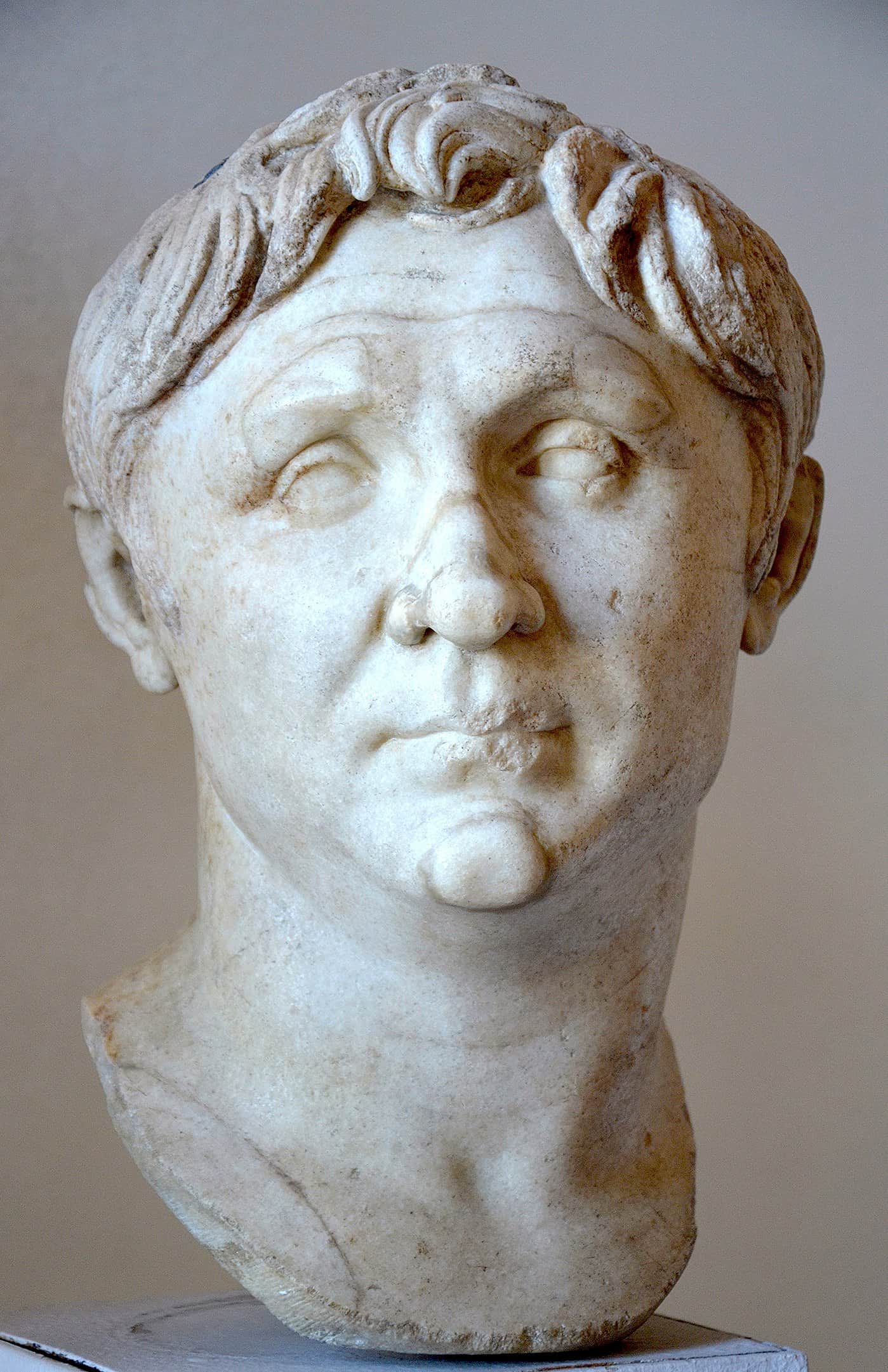
Caesar finally managed to confront Pompey in 48 BC.
Caesar spent the past year in Spain, with Mark Anthony holding Italy in his name. While in Spain, Caesar defeated Pompey’s allies in the region, before finally heading to Greece. They fought twice, first at Dyrrhachium and again at Pharsalus, with Caesar winning both times.
Pompey ran to Egypt, while Caesar returned to Rome, with the Senate officially appointing him as dictator. Just 11 days later, and after winning an election to become consul, Caesar resigned his appointment as dictator.
Pompey’s assassination in Egypt enraged Caesar.
Caesar pursued Pompey to Egypt, planning to arrest his old rival and bring him to Rome. Caesar may also have had long-term plans to pardon Pompey, allowing him to demonstrate mercy to his enemies.
Instead, the Ptolemies of Egypt presented him Pompey’s head, supposedly as a peace offering. To their horror, Caesar reacted with outrage and fury, as Pompey remained a Roman citizen. More than that, Pompey’s term of office as a Roman consul remained unfinished.
For a Roman citizen and a consul to die like a common criminal without a fair trial counted as a major scandal in Roman eyes. This led Caesar to force the Ptolemies to hand over Pompey’s murderer to face Roman justice or face war with Rome.
Romans found Caesar’s victory celebrations in bad taste.
This came from the fact that Caesar essentially celebrated his victory in a civil war, with fellow Romans as his enemies. They also criticized the extravagance of Caesar’s victory celebrations, one of which involved a mock battle between 4,000 men, 400 horses, and 40 elephants.
This eventually led to a riot, only stopped when Caesar had two of the rioters sacrificed on the Field of Mars outside of Rome. That said, Romans praised Caesar for his merciful conduct, specifically his granting of pardons to defeated enemies still alive.
As dictator, Caesar introduced a series of new laws to Rome.
Those included new regulations on luxuries for sale, as well as rewards for families with many children. He also reduced the public grain ration, and reformed the system used to select jurors. He also increased regulations on professional guilds, and introduced term limits for provincial governors. Caesar also reformed Rome’s taxation system and introduced plans for land reform.
He also introduced the Julian Calendar at this time.
At the time, Rome used a lunar calendar, but Caesar’s experiences in Egypt led him to conclude that solar calendars had more accuracy with the seasons. This led to the development of the Julian Calendar, the direct predecessor of the modern Gregorian Calendar.
Like its successor, the Julian Calendar had 365 and ¼ days in a single year, with an additional day to February every four years. To reconcile the old and new calendars, Caesar ordered the addition of three months to the year 46 BC.
Caesar also planned for new military campaigns at this time.
In particular, he wanted to conquer the Parthian Empire, covering modern day Iraq and Iran, as well as parts of the Arabian Peninsula. From there, he planned for additional campaigns north into Scythia, which stretched from Central Asia to Eastern Europe. After Scythia, he would then strike into Germany from the east, and return full circle back to Rome.
Shortly before his death, the Senate renamed a month in his honor.
July was named in honor of Julius Caesar. Quintilis, which was his birth month, was renamed July when he died. Quintilis means “fifth month” in Latin, which represents where this month originally fell in the Roman calendar.
Caesar alarmed many Romans with certain decisions, leading to his assassination.
Three developments stood out in particular. The first took place in either December 45 or January 44 BC, when Caesar failed to stand as a protocol which was demanded on the Senate’s arrival. He also defied tradition when he rejected a new series of public honors from the Senate. This led to the perception that Caesar had lost his respect for the Senate.
Then in 44 BC, a pair of tribunes found a crown on the head of Caesar’s statue in the Roman Forum. Though Caesar publicly condemned the crown’s presence, this led to rumors of ambition on his part to become King of Rome.
Caesar’s own accusations against the tributes of stirring up a scandal against him did not help matters. Finally, and also in 44 BC, Mark Anthony crowned Caesar after Anthony’s election as co-consul. Once again, this only made the rumors of Caesar’s royal ambitions grow even further.
At least 60 senators participated in the plot against Caesar.
Cassius Longinus and Marcus Brutus first conspired to assassinate Caesar in February of 44 BC after the incident with Mark Anthony. Brutus pushed to include as many senators in the conspiracy, to show how many of the republic’s leaders opposed Caesar. He also opposed a proposal to assassinate Caesar’s leading allies, such as Mark Anthony.
He believed doing so would make them appear overambitious, when in reality they only wanted to protect the republic from Caesar’s ambitions. In the end, the conspirators followed Brutus’ lead and set the date on March 15, the so-called Ides of March.
They ambushed Caesar in the Theater of Pompey, where the Senate held its meetings. Caesar blocked the first blow by Lucius Tillius Cimber, but the other conspirators overwhelmed Caesar and stabbed him to death. Caesar said his last words to Brutus, the famous question of, “You too, Brutus?”
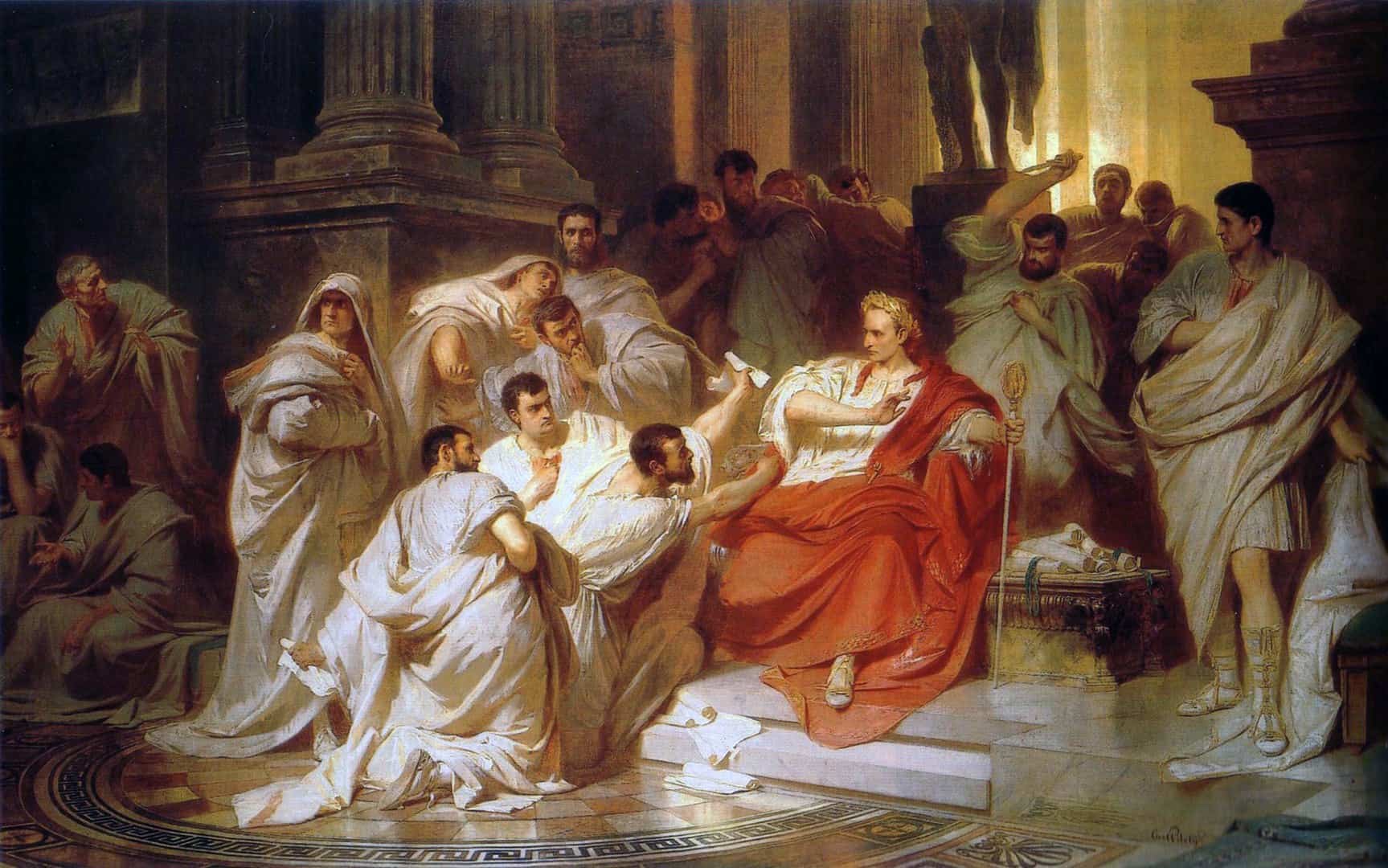
Caesar’s death caused public outrage in Rome.
Brutus and his allies proclaimed Caesar’s death as a call for celebration, on how they had freed Rome from a tyrant. They found themselves met with silence from Rome’s citizens, which erupted into anger during Caesar’s public funeral.
A riot erupted at the Roman Forum, which started a fire that damaged the surrounding areas. Angry mobs assaulted the houses of the leading conspirators, such as Brutus, in particular. This forced them to run to Greece, where they assembled an army, expecting an attack from Caesar’s allies.
It also sparked another civil war.
Mark Anthony took the lead immediately after Caesar’s death, but Caesar had named his grandnephew Octavian as his heir. Both Octavian and Anthony joined forces and led their combined armies to Greece to bring Caesar’s killers to justice.
They also found another ally in Lepidus, and the three of them formed the Second Triumvirate. At the Battle Of Philippi in 42 BC, they defeated Brutus and his allies, with the survivors committing suicide rather than face capture.
The Triumvirate then agreed not to repeat Caesar’s mistake of showing mercy to their enemies and proceeded to purge all their enemies. They then divided the republic between them, with Octavian governing the western provinces, Lepidus the African provinces, and Anthony the eastern provinces. All three of them shared authority over Italy.
Caesar’s grave lies in the Temple Of Caesar in Rome.
Caesar’s family and supporters originally wanted to bury him on the Capitoline Hill but faced resistance from the Roman priesthood. This led them to bury Caesar in the Roman Forum, where his ashes stayed despite opposition from his enemies.
Construction on the Temple of Caesar began in 42 BC, and finished in 29 BC, during the reign of Emperor Augustus. The Emperor personally dedicated the temple, during the anniversary of his victory against Anthony and Cleopatra at the Battle Of Actium in 31 BC.
The temple remained intact even after the Fall Of The Roman Empire and the rise of Christianity, until the 15th Century. In that century, most of the temple became cannibalized for building materials for churches. Today, only the central part of the temple remains intact and enjoys protection as a historical structure of Rome.
The Senate later named Caesar as a god in 42 BC.
He became the first Roman to ever receive that honor, with the Roman Emperors following his example. Ironically, the Senate resisted pressure from the Second Triumvirate to make Caesar a god, but the appearance of a comet changed things. Rome’s priests and priestesses saw it as a sign from the gods, confirming the popular demand for Caesar to become a god, leading the Senate to change its position.
Mark Anthony became the first priest of what the Romans called “Divus Iulius” literally meaning the Divine Julius. And after his ascension as the first Roman Emperor, Augustus adopted for himself the title “Divi Filius” literally Son of the Divine.
Caesar’s grandnephew Octavian ultimately realized Caesar’s political ambitions.
Octavian first seized North Africa from Lepidus and exiled him to Sicily. Lepidus’ own troops in Italy defected to Octavian, giving him the military strength to dominate Italy. Meanwhile, Mark Anthony started an affair with Cleopatra, despite having married Octavian’s sister Octavia. He later divorced her in 33 BC, before marrying Cleopatra in 32 BC.
This caused a major scandal in Rome, made worse when Octavian gained a copy of Anthony’s will, where he named Rome’s eastern provinces to Cleopatra. This led the Senate to back Octavian in declaring war against Anthony and Cleopatra. The Roman Navy then defeated the Egyptian Navy at the Battle of Actium, but Anthony and Cleopatra managed to escape to Egypt.
There they committed suicide, as Octavian’s armies marched on Egypt. Recognizing Octavian’s absolute power, the Senate appointed him Princeps, or First Citizen, and gave him the name Augustus, or Revered One.
Caesar’s military ambitions, however, died with him.
Unlike his granduncle, Augustus believed that Rome’s borders should lie on easily defended geographical features. In Western Europe, he set those borders on the Rhine River, and in Eastern Europe, the Danube River. In Asia, Augustus set those borders along the Euphrates River. He then advised his successors to avoid expanding further and to instead focus on keeping the empire stable.
Most of his successors followed his advice, with the exception of Emperor Trajan. Trajan conquered Mesopotamia, extending Rome’s eastern borders to the Tigris River, and the Persian Gulf. He also conquered Armenia, pushing the border to the Caspian Sea, as well as crossing the Danube River into Dacia. However, his successor Emperor Hadrian abandoned those conquests and returned Rome to its previous borders.
He also had Caesar’s biological son Caesarion murdered.
Originally, Augustus leaned towards showing Caesarion mercy, even though, as Caesar’s biological son he could challenge Augustus’ claim as Caesar’s heir. Given that Caesar and Cleopatra hadn’t actually married each other, Augustus could have safely shown mercy. However, one of his advisors, Arius Didymus, paraphrased Homer about how “too many Caesars is not good”. This finally led Augustus to order Caesarion murdered, supposedly by strangulation. The Ptolemaic Dynasty of Egypt also died with Caesarion, with Augustus personally taking control of Egypt afterward.
Caesar’s line continued through Augustus.
Augustus’ stepson Tiberius succeeded him as Roman Emperor, with his grandnephew Caligula succeeding him in his turn. After Caligula’s assassination in 41 AD, his uncle and Augustus’ grandson Claudius became Roman Emperor. Claudius’ stepson Nero poisoned him in 54 AD and became the last Emperor of the Julio-Claudian Dynasty.
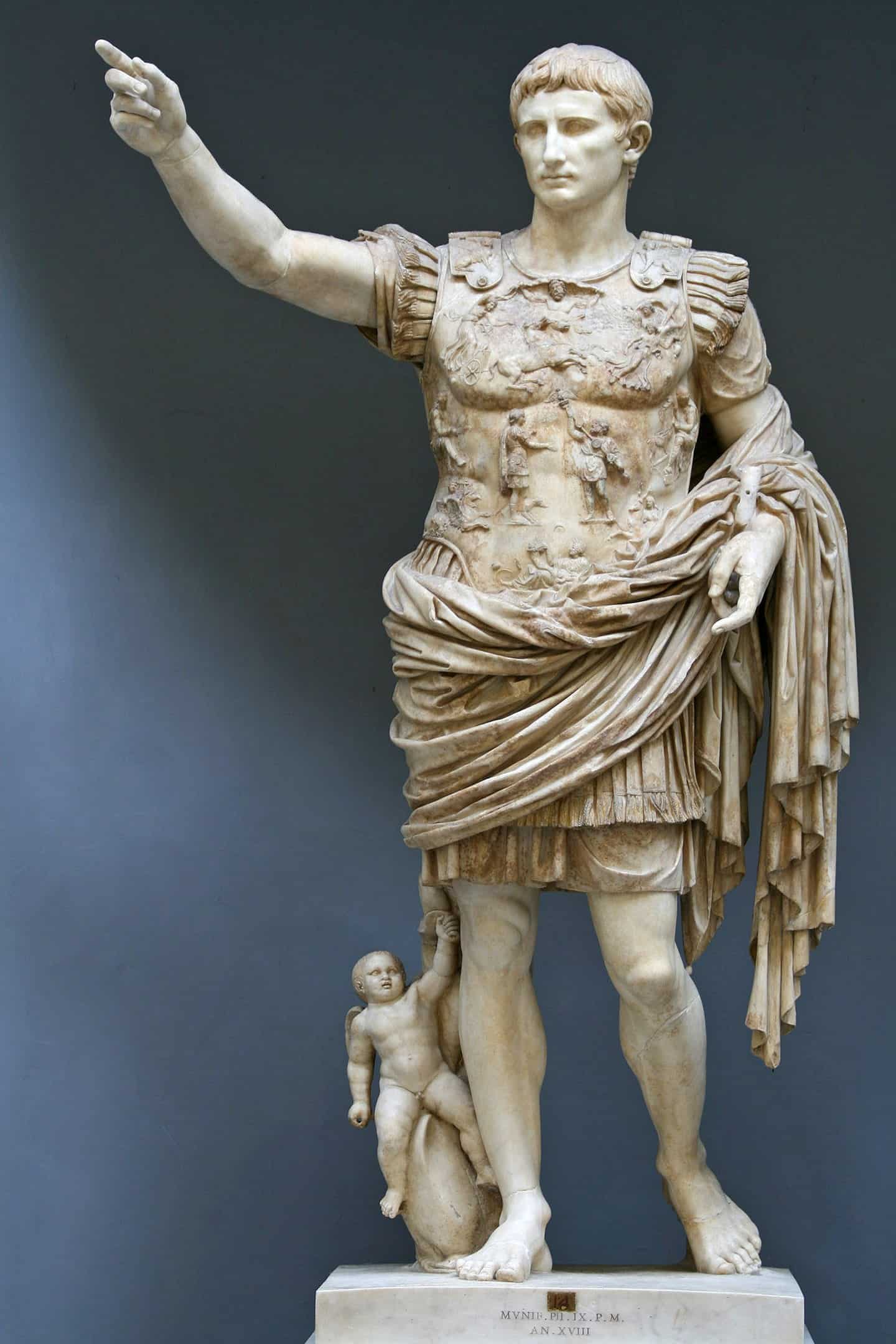
Claudia Augusta became the last known descendant of Caesar’s family.
Born Emperor Nero’s only daughter by his second wife Poppaea Sabina, she died only four months after her birth. The Emperor and his consort publicly mourned her death, with the Emperor naming her a goddess soon after. He also built a temple for her, with its own dedicated priesthood.
Caesar supposedly had other natural children.
Plutarch claimed that Caesar believed Brutus was his son, born from his closeness with Brutus’ mother Servilia in their youth. Modern historians question this, as Brutus’ age means Caesar would have fathered him at only 15 years old.
That said, historians generally agree that Caesar and Servilia did have a daughter, Junia Tertia. Caesar also treated Brutus’ cousin Decimus as a son, with historians agreeing on the possibility of Decimus as Caesar’s natural son. In fact, Caesar declared in his will that if Octavian died before him, then Decimus would become Caesar’s heir.
Caesar’s critics in life also accused him of homosexuality.
They particularly focused on Caesar’s friendship with King Nicomedes. They even called him Queen of Bithynia, much to Caesar’s outrage and denial, even when he was under oath at one point.
Historians generally side with Caesar on this, with Romans commonly using accusations of homosexuality as a form of slander. The poet Catullus also made two poems about how Caesar had a sexual relationship with the engineer Mamurra, a military officer and engineer who served under Julius Caesar.
Catullus later apologized for the slander. Mark Anthony also accused Octavian of sleeping with his uncle to become Caesar’s heir. Much like with Caesar and Nicomedes, historians both Roman and modern dismiss them as mere slander.
Caesar also made other written works beyond his records of the Gallic Wars.
Among the earliest he wrote include a funeral oration for his Aunt Julia, who died in his youth. He also wrote “Anticato,” a public denunciation of the Roman Senator Cato, in response to fellow Senator Cicero’s praise. Roman sources also claim Caesar wrote several poems of his own, but much like most of his literary work, none have survived to the present day.
Caesar gave his name to the Caesarism school of thought.
The name itself only existed in modern times, but the themes stretch back over 2,000 years to Caesar’s time. Those include a charismatic strongman ruling the nation by force, supported by a cult of personality.
Other themes of Caesarism include a violent social order, as well as a dominant role for the military in the government. Followers of this school of thought include Emperor Napoleon Bonaparte Of France, and the fascist dictator Benito Mussolini. Some historians even think this makes Caesarism the direct predecessor of both fascism and populism.
Was this page helpful?
Our commitment to delivering trustworthy and engaging content is at the heart of what we do. Each fact on our site is contributed by real users like you, bringing a wealth of diverse insights and information. To ensure the highest standards of accuracy and reliability, our dedicated editors meticulously review each submission. This process guarantees that the facts we share are not only fascinating but also credible. Trust in our commitment to quality and authenticity as you explore and learn with us.


